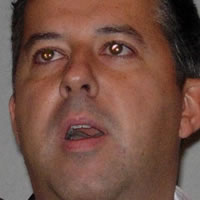 BSkyB’s Director of Product Management, Gerry O’Sullivan couldn’t help sounding smug as he took centre stage at The Connected Home conference in London today.
BSkyB’s Director of Product Management, Gerry O’Sullivan couldn’t help sounding smug as he took centre stage at The Connected Home conference in London today.
“Those of you who read the papers may have noticed we bought a small Internet company last Friday,” he announced. “To have a combination of satellite distribution and broadband connectivity solves all problems”.
O’Sullivan’s presentation focused on Sky+ and stated the need for a “whole home solution” but he was keen to distance himself from existing IP-based offerings such as the Windows Media Player.
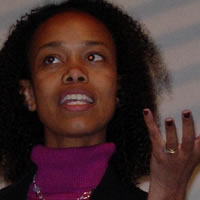 While Microsoft’s Cynthia Crossley and Telewest’s Mark Horley nodded collaboratively to Merlin Kister of Intel’s assertion that “We mustn’t be close minded and pick a winner. It’s important for all players to work together,” O’Sullivan looked disinterested.
While Microsoft’s Cynthia Crossley and Telewest’s Mark Horley nodded collaboratively to Merlin Kister of Intel’s assertion that “We mustn’t be close minded and pick a winner. It’s important for all players to work together,” O’Sullivan looked disinterested.
“I’m a fan of Media Player – but my mum doesn’t want a reminder to renew her anti-virus subscription while she’s watching Coronation Street,” he said.
And, in response to an audience show of hands revealing nearly all had regular problems with programme crashes on their PCs, O’Sullivan added:
 “There’s zero tolerance (among our customers) for that sort of unreliability and pain…we can only roll out products that you switch on and they work.”
“There’s zero tolerance (among our customers) for that sort of unreliability and pain…we can only roll out products that you switch on and they work.”
And BSkyB has the money and ambition to keep turning out products it thinks consumers may need – the five day old Sky Gnome for example, enabling you to listen to satellite radio in the garden, or the new movies over IP service, Sky By Broadband – due to launch in the next two weeks.
The third generation Sky+ boxes have 160GB of space – only half are visible to the consumer – the other 80GB of disc space is for BSkyB to keep as a store for future ‘on demand’ programming, O’Sullivan revealed.
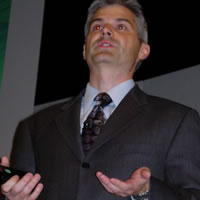 Horley mentioned that Telewest was launching its own 160GB PVR in early 2006, with the WHOLE disc available for recording “as we already offer video on demand”.
Horley mentioned that Telewest was launching its own 160GB PVR in early 2006, with the WHOLE disc available for recording “as we already offer video on demand”.
Sky can’t support true VOD – it’s satellite distribution network has limited bandwidth and lacks an intrinsic return path – but do consumers care?
With Sky+ proving a virtually churn-free proposition (apparently 90 per cent of viewers say they’re very satisfied), Easynet on board and plenty of money in its pocket, O’Sullivan can’t help but smile – looks like BSkyB is onto a winner.
 The futuristic vision of a connected home with content moving seamlessly from our TV to our PC and on to our mobile device is still a long way off, according to key speakers at The Connected Home conference in London today.
The futuristic vision of a connected home with content moving seamlessly from our TV to our PC and on to our mobile device is still a long way off, according to key speakers at The Connected Home conference in London today. It took Dimitri Van Kets (pictured left), from Belgian telco, Belgacom, to voice what many were thinking by announcing that the networked home was “little more than a mass of standards” and “too confusing” for the average consumer. Unless the service providers get together and educate customers, he said, true home connectivity was never going to happen.
It took Dimitri Van Kets (pictured left), from Belgian telco, Belgacom, to voice what many were thinking by announcing that the networked home was “little more than a mass of standards” and “too confusing” for the average consumer. Unless the service providers get together and educate customers, he said, true home connectivity was never going to happen. Paul Szucs of Sony said that service providers should “try not to lose the plot with content protection”, adding that “consumers simply want their devices to work together and share content.”
Paul Szucs of Sony said that service providers should “try not to lose the plot with content protection”, adding that “consumers simply want their devices to work together and share content.” We saw it with the Internet in the late 90s and iTV in the early noughties, now mobile TV is the disruptive technology du jour.
We saw it with the Internet in the late 90s and iTV in the early noughties, now mobile TV is the disruptive technology du jour.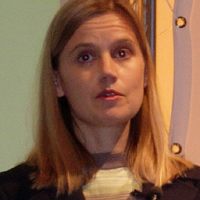 It’s easy to be swept up in the hype, and persuasive arguments abound.
It’s easy to be swept up in the hype, and persuasive arguments abound.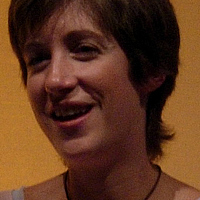 Claire Tavernier from Fremantlemedia (right), owner of Neighbours and Baywatch, said “Fremantle TV” would launch on US mobile networks before the end of the year.
Claire Tavernier from Fremantlemedia (right), owner of Neighbours and Baywatch, said “Fremantle TV” would launch on US mobile networks before the end of the year.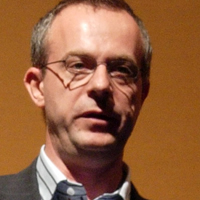 But is the industry is in danger of death by over-sell before it’s even arrived?
But is the industry is in danger of death by over-sell before it’s even arrived?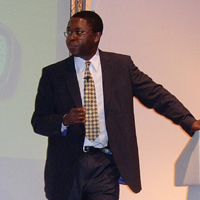 This is all sounding very familiar – we’ve been here before. As with the early days of the Internet and iTV, business models are unclear. Hurdles include lack of appropriate content – including rights clearance on existing properties, lack of spectrum and unproven consumer demand.
This is all sounding very familiar – we’ve been here before. As with the early days of the Internet and iTV, business models are unclear. Hurdles include lack of appropriate content – including rights clearance on existing properties, lack of spectrum and unproven consumer demand.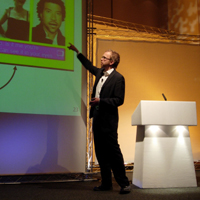 Tavernier also talked about rights, revealing that although Fremantlemedia owned worldwide TV rights to Mr Bean and The Benny Hill Show, both Rowan Atkinson and Benny Hill’s widow had said no to mobile distribution.
Tavernier also talked about rights, revealing that although Fremantlemedia owned worldwide TV rights to Mr Bean and The Benny Hill Show, both Rowan Atkinson and Benny Hill’s widow had said no to mobile distribution.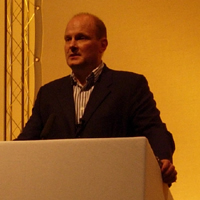 The most telling figures came in the final session of the conference: “Viewers don’t see their mobile as an entertainment device” said Enpocket’s Jeremy Wright (right). “They see it first and foremost as a communicator.”
The most telling figures came in the final session of the conference: “Viewers don’t see their mobile as an entertainment device” said Enpocket’s Jeremy Wright (right). “They see it first and foremost as a communicator.”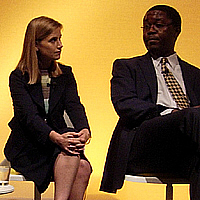 Hyacinth Nwana, (pictured left) speaking for Arqiva, and Jeremy Wright of Enpocket, both saw advertiser funded content – whether programming or entertaining video ‘spots’ – to be the key driver.
Hyacinth Nwana, (pictured left) speaking for Arqiva, and Jeremy Wright of Enpocket, both saw advertiser funded content – whether programming or entertaining video ‘spots’ – to be the key driver.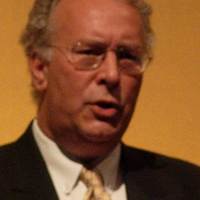 The UK production and development community is in danger of losing out to competition from overseas if it doesn’t wake up to the potential of mobile TV, said Mark Selby, Nokia’s Global Vice President for Multimedia, (pictured right) at the inaugural Mobile TV forum in London today.
The UK production and development community is in danger of losing out to competition from overseas if it doesn’t wake up to the potential of mobile TV, said Mark Selby, Nokia’s Global Vice President for Multimedia, (pictured right) at the inaugural Mobile TV forum in London today.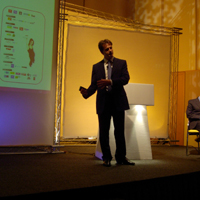 But many claimed that the lack of spectrum is holding DVB-H back in the UK.
But many claimed that the lack of spectrum is holding DVB-H back in the UK.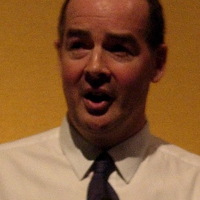 Digital One owns the UK’s only nationwide commercial DAB multiplex – but the capacity allocated for DMB is minimal.
Digital One owns the UK’s only nationwide commercial DAB multiplex – but the capacity allocated for DMB is minimal.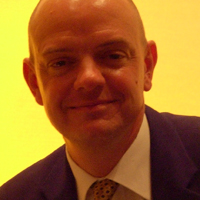 BT will roll out IPTV in ‘late summer 2006’, according to Andrew Burke, CEO, BT Entertainment, (pictured right) speaking at the Enhanced TV Show in London today.
BT will roll out IPTV in ‘late summer 2006’, according to Andrew Burke, CEO, BT Entertainment, (pictured right) speaking at the Enhanced TV Show in London today.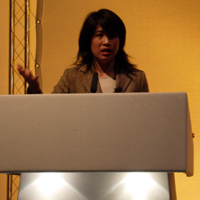 Elena Branet, Senior Marketing Manager at Microsoft TV, (pictured left) said IPTV would allow viewers to use picture in picture channel surfing, see caller ID on their TV sets, or watch TV while messaging a virtual community of friends and family. She said that basic IPTV would be possible with a minimum connection speed of just 1.5 MB.
Elena Branet, Senior Marketing Manager at Microsoft TV, (pictured left) said IPTV would allow viewers to use picture in picture channel surfing, see caller ID on their TV sets, or watch TV while messaging a virtual community of friends and family. She said that basic IPTV would be possible with a minimum connection speed of just 1.5 MB.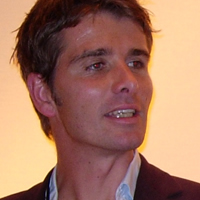 Also at the show, David Bainbridge, MD of Yes, Yoo Media, (pictured right) said trials of a new product, ‘Broadband TV’ would start on ntl in October. Not to be confused with IPTV, this is a solution to help content creators repurpose content across platforms – working with cable TV, IPTV and 3.
Also at the show, David Bainbridge, MD of Yes, Yoo Media, (pictured right) said trials of a new product, ‘Broadband TV’ would start on ntl in October. Not to be confused with IPTV, this is a solution to help content creators repurpose content across platforms – working with cable TV, IPTV and 3.